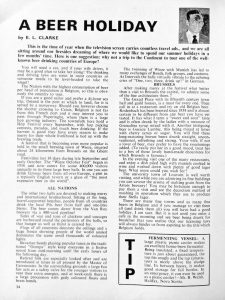 Gather ye rose buds, lads and lassies. Five more weeks until Labour Day weekend looms. Back to school ads on the TV start soon. Remember: every fair from fair sometime declines. Boom. Chucka. Lucka. Photo of the week is from retiredmartin who has been out gathering. Note the first: check out the third person’s experienced expression. Note the next: there is a missing fourth person. What is not to love?
Gather ye rose buds, lads and lassies. Five more weeks until Labour Day weekend looms. Back to school ads on the TV start soon. Remember: every fair from fair sometime declines. Boom. Chucka. Lucka. Photo of the week is from retiredmartin who has been out gathering. Note the first: check out the third person’s experienced expression. Note the next: there is a missing fourth person. What is not to love?
A great start this week so far, don’t you think? Let’s go! Next, Dr. J. Nikol Jackson-Beckham spoke at Slow Food Nations about the progressive influence craft beer has on communities – something I would have thought would have been happening at every slow food conference since time began. She sat for an interview on her thoughts about food and justice:
Largely people are heartbroken because their intentions are good but haven’t actually been realized in their business. The project of equity, inclusion and justice tends to overwhelm people with a sense of fear of doing it wrong. So my approach is to come at this as a huge opportunity for a business both in terms of social good and the bottom line. To do this, a business has to think about it on par with all other organizational goals, build infrastructure and then talk through specific tactical scenarios that people can grab on too.
Here’s some science for you. Drinking is being studied studiously and one study has found out that folk are not altering their habits all the same way. It asked the question “why are alcohol-specific deaths going up in Britain when alcohol consumption is going down?”
Countervailing alcohol consumption and alcohol‐related harm trends in the UK may be explained by lighter and heavier drinkers having different period and cohort trends as well as by the presence of cohort trends that mean consumption may rise in some age groups while falling in others.
I heard a similar science-like story on NPR Monday morning but never found the link. [It’s sad when things turn out like that.] But the point was teens seem to be reversing what the last set of teens did and the newbies are turning to the bottle after their elder teens of the last ten years have been subsisting digitally.
Writing advice. Boak and/or Bailey included more than one excellent observation in their monthly newsletter but I liked this one the bestest:
A couple of weeks ago we posted about migrant workers from Suffolk in the Burton brewing industry. In a follow-up Tweet we said: “TIP: If you really want to learn about beer and brewing, don’t just read beer writers – look beyond.” This is something we think is important. When we wrote Gambrinus Waltz, for example, most of the research was undertaken in newspapers, old magazines, books about London, theatrical biographies, autobiographies… We hardly looked at a single book by a capital-B, capital-W beer writer, except for Ron Pattinson and Martyn Cornell.
Sounds like a couple of dodgy sorts to me… but the point is correct: get ye to the primary records as often as possible. Right after the rosebuds. Or perhaps they are your idea of rosebuds. Good all-round general thinking advice, when you think of it.
Hmm. Not sure I like this. The next nightmare beverage has apparently shown up in Malaysia:
Asians love the bubble milk tea. They love beers as well. One franchise has decided to merge the both together in what it considers the “matchmake of the century”… The Boba Beers consists of Butter Beer made with Kirin Ichiban, Guinness Milkshake with Guinness (duh), Strawberry Lime Cider made out of Apple Fox Cider, and Watermelon Beer mixed with Tiger Beer.
I don’t judge but, well, it sounds pretty yik. I expect some craft brewer will update* it and the kids will go nuts. Because tea+beer=boba can’t help but be cheaper to make than even beer+juice+radler.
Geoff Latham had a good go at pointing out that one craft fabulous UK brewer selling into the EU was seemingly breaking the law:
It’s not allowed under EU rules. They closed the “personal import by post” loophole when tobacco sales by post rocketed. The person importing can have their goods seized and face prosecution. The company exporting also can if the correct customs documents don’t accompany the beer
I liked Zak Avery’s experienced views on the matter, too. Craft is all fine and good but a couple of weeks of short sharp shock might be called for.
New brewery news: Ontario emigrants brewmaster Andrew Bartle, marketing manager Marissa Bégin have declared their new operation The Church Brewing open for business. This is great and especially so as they are located in Wolfville, Nova Scotia** near where I grew up, where my Dad was a United Church minister which means he likely went to presbytery meetings in a future brewery.
I am enjoying the approach Matt Curtis and his journal Pellicle are taking in treating good beer as part of broader food and rink production. British wine has been included in that scope this week:
Thanks to this bumper crop, British wine is being spoken about with more fanfare than ever before. British sparkling wine, particularly from vineyards based in Sussex and Kent, is now widely recognised to be on par with Champagne. This perhaps explains why in 2017 the Champagne house Taittinger planted vines in Kent (though, due to its appellation, they cannot call what they make here Champagne) in order to exploit similar growing conditions as the prestigious house enjoys in France.
 Boak and Bailey have hit for the double this week when on Wednesday they posted a tweet with a link to a 1971 article from the publisher of the foundational and likely all-time leading home brew and good beer books in terms of sales, Amateur Winemaker. The article is about beer tourism to Belgium, a copy of which is produced to the right. I love it. While a bit cringe making on topics matrimonial, it is far less creepy in its sexist approach than the sometimes leering thoughts of one Mr. Jackson when he spoke of ladies AND it does an excellent job describing the subject matter of his article – traveling to Belgium in that year of 1971 to explore the beer culture. I particularly like the observation that sweetening sour beers like Rodenbach or Gueuze was locally common. This primary record proves their earlier observation – and raises again the question of why no one has seriously studied the influence of Amateur Winemaker publications. Then again, perhaps Columbus did actually discover the New World.
Boak and Bailey have hit for the double this week when on Wednesday they posted a tweet with a link to a 1971 article from the publisher of the foundational and likely all-time leading home brew and good beer books in terms of sales, Amateur Winemaker. The article is about beer tourism to Belgium, a copy of which is produced to the right. I love it. While a bit cringe making on topics matrimonial, it is far less creepy in its sexist approach than the sometimes leering thoughts of one Mr. Jackson when he spoke of ladies AND it does an excellent job describing the subject matter of his article – traveling to Belgium in that year of 1971 to explore the beer culture. I particularly like the observation that sweetening sour beers like Rodenbach or Gueuze was locally common. This primary record proves their earlier observation – and raises again the question of why no one has seriously studied the influence of Amateur Winemaker publications. Then again, perhaps Columbus did actually discover the New World.
Finally, a point of view from our side good beer on the word authenticity. While I am a bit of a loaf, I do like reading about good menswear as I am a man who needs to wear things. Permanent Style is one of the best current guides to things I can never afford which offers an alternative voice on matters analogous to good beer and here is their take on that word:
In the past couple of years ‘authentic’ has become increasingly important to how I see clothing. Partly, this is because the other terms – or values – have become less important. Heritage has been overemphasised. Frankly, some old companies make terrible products and are stuck in the past, unable to adapt either to changing consumer expectations or the media that markets them. So too has craft. The fact it is done by hand doesn’t necessarily make it better. Some craftsmen set out on their own before they’re ready, and deliver a poor product. And some things are just better made by machine.
Interesting. Given most “craft” beer is made on computerized set ups that manage much of the process automatically, the comparison may well be a useful one.
Well, that is it for now. Not a boring week at all. Boak and Bailey should have even more to share on Saturday and I am now trusting Stan to being back again Monday. Consider, too, the OCBG Podcast which is broadcasting the thoughts of Robin and Jordan as they observe upon good beer each Tuesday now coming on three months or so.
*aka poach.
**pronounced “Wuhff-fuh” locally.

I think they are writing about English wine ( made in England with English grown grapes).
British wine is made from imported juice or concentrate.
Trust things to get messed up when it comes to describing beverages. They do use the words “British wine” in the article but I take your point.
Wow! That nightmare beverage in Malaysia sounds wild. Yik is right